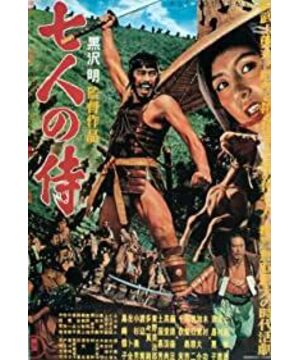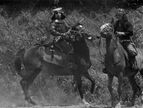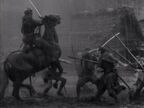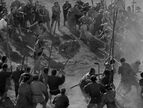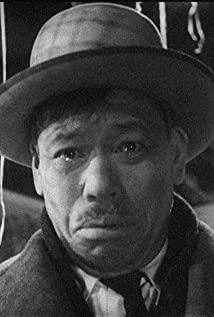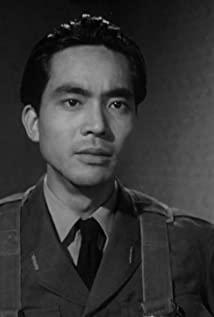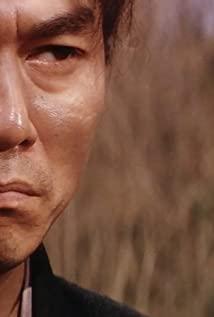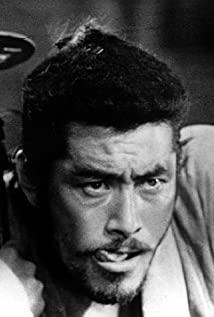(1)
This is no longer a time for samurai.
Looking at the wandering warriors walking on the city streets with their heads held high in the film, it is inevitable that there will be a lot of grief in my heart. From the proud faces, it seems that the glory and honor of the past can still be seen, but the unsatisfied stomach, the vain footsteps, and the pretentious arrogance clearly tell us the loneliness of the Japanese samurai in that era. . The hero Qilang who escaped heroically from the battlefield has become a small trader who walks the streets. Heihachi, who used to be full of pride, optimistically chops firewood for others just to be able to eat, and a warrior with a true temperament lives at the bottom of the society. .
"I was also as young as you, honed myself, made great contributions on the battlefield, established great achievements, and became a city lord in the future. But before I knew it, my hair had turned gray, and time flies, my parents and friends, all died one by one... "The words that Kanbei said to Katsushiro when all the samurai sat around are undoubtedly the highlight of the main line of the film. This is not only the emotion of a gray-haired person, but also contains the spirit and ideals of a samurai. After hearing this, the silence and thinking of all the samurai had to shock us. These warriors who had countless ideals and lofty sentiments back then don't know how to realize themselves today. Isn't the samurai Kuzo, who only focuses on his sword skills, an escape from real life?
Kanbei, the representative of the seven samurai, has experienced many battles and is brave and brave. When he saw that the farmers used a little white rice to hire samurai, I think he sympathized with the suffering of the farmers and hoped to save them. In addition to the predicament, farmers may also want to find the life they deserve from this kind of rescue. But the truth is, in order to help the farmers die four warriors one after another, the last three warriors stood watching the farmers work happily, looking at the tomb with the samurai sword, but sighed with emotion: "This time it is also a defeat. The peasants won." Yes, the samurai only served as the helpers of the peasants to defeat the bandits who intruded upon them, and the peasants won the victory, while the samurai would still not know their own lives, and would still be displaced. The victory they splashed with blood had nothing to do with them.
In such a time of war, the emergence of hot weapons made the samurai's superb martial arts and the swords in their hands become worthless. The decline of the samurai class has caused those samurai who were once high in the world to lose the stage to realize themselves. They are so chaotic, numbing themselves with the dignity of the surface, and the road under their feet is so blurry...
(2) I have
seen the movie Perhaps all of them despised the selfishness, cowardice and snobbery of the peasants in the film. As the peasant-born Kikuchiyo said, they are as cunning as foxes, pretending to be honest on the surface, they are not saints, they are stingy, cunning, crying, evil, stupid and even murderers who hunt defeated samurai. They hunted down the defeated warriors, scavenging from them for something of value.
We don't care whether their behavior is caused by the long-term oppression of those domineering samurai, which is actually the most natural manifestation of people who seek to survive. We can't forget the scene at the beginning of the film, where a group of weak peasants sit around and weep. They complained why there was no god to bless them, land taxes, forced labor, war, drought had burdened their lives, and robbers had added to their distress.
When the samurai who were willing to fight for them entered the village, they closed their doors for fear that the samurai would threaten their own lives, but when they heard that there were bandits, they all cried out, "Samurai !help me!". Those samurai who were enemies in their minds instantly became gods in their minds because they could protect them. When the samurai helped them defeat the bandits, they only cared about themselves working happily in the fields and wishing for victory, but they didn't even thank the samurai who had saved their lives. And the sentence "How can a farmer's daughter be with a samurai?" is even more shocking.
We used to think that the simple peasants actually have such a face. When we blame them, should we also think about the fault of the times? In that era of constant wars and riots, the peasants had no guarantee of life. The invasion of war and the loss of labor force made their life so hard, and what could the government they depended on give them? "Every time, the bandits come after they have left, and they only receive food." In order not to starve themselves, they had to submit to the bandits servilely, even in exchange for women's sex. In such an environment, how can we ask them to be noble? As animals, the first thing is to survive. When survival is still facing difficulties, how can we scold them spiritually? From this point of view, these behaviors of farmers seem to have not been as bad as before.
The peasants, it seems, won after the samurai helped them defeat the bandits. But how long will such a "prosperous age" of pleasant work last? Nobody knows. Those timid and weak farmers are actually the tragic ones in the film. They also don't know how they will live in the future. Although there is land that can be cultivated, there is no food that can be guaranteed. They have no government to rely on, no "god" to protect them, they can only rely on themselves, and how can they rely on themselves? They don't know either...
(3)
In the whole film, the most hateful are those bandits. They live by robbing the peasants of their food, and they also set fire and kill. These sturdy robbers are actually a group of people who don't know how to survive. War, famine, etc. made them only rely on looting and killing to maintain their own survival. But not every snatch is a wish, and when they encounter a village with the help of samurai, what awaits them is destruction. Even when they knew there was an ambush, they still broke into the village, not because they were stupid, but because they ran out of food and grass, because their survival was in crisis, so they chose to work hard.
They also have no purpose in life, relying on desperate snatch to maintain their survival for a period of time, and then have no choice, and start a new snatch. Every time this kind of dehumanizing behavior is just to survive this seemingly simple but extremely difficult word at that time. They also have no future of their own. For them, life is looting and killing, without purpose and without end...
The film starts with the peasants hiring samurai to deal with bandits as the main line, and presents us with images of each era. Poke aside the layers of contradictions and analyze the human nature bit by bit. In that era of war, three groups that rubbed against each other but did not know what to do with each other were vividly displayed in front of us. From them, we began to think about human nature, the times, and society. And what are we to blame for all these disgusting acts? Is it human nature or the times? unknown.
View more about Seven Samurai reviews


